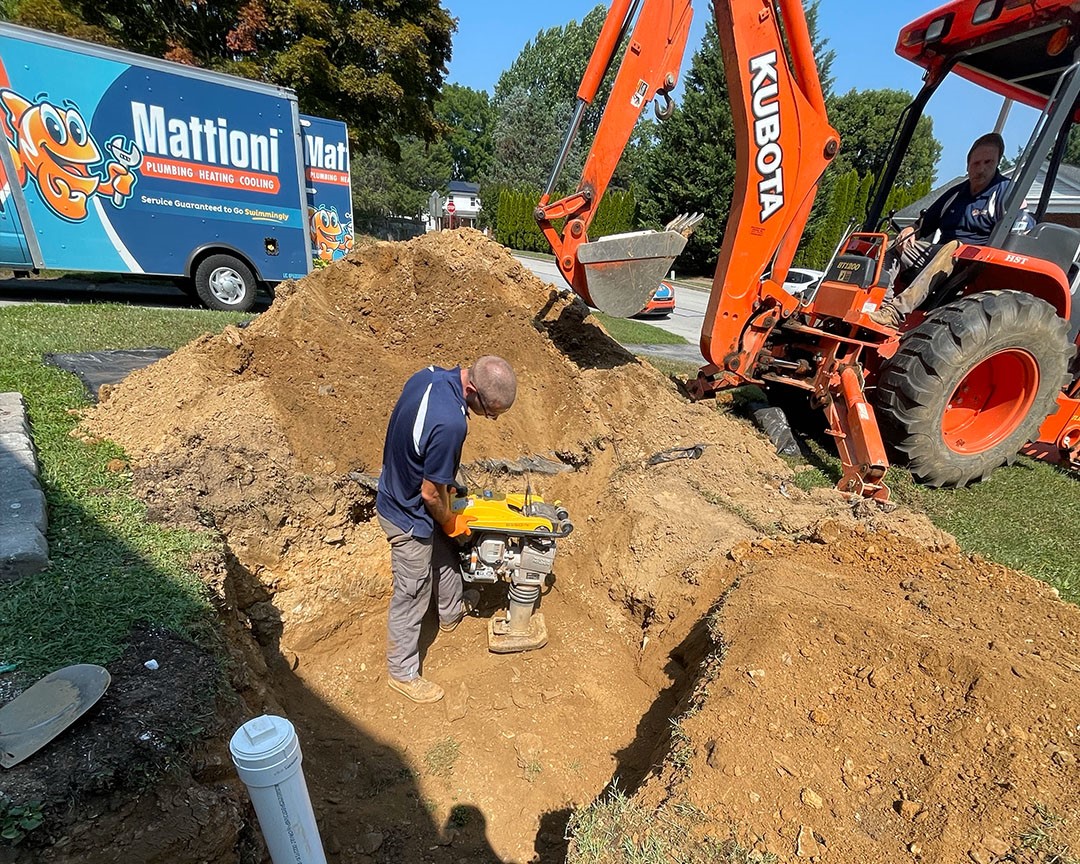|
Getting your Trinity Audio player ready...
|
As the cold, dry air of winter settles in, familiar discomforts like chapped lips, dry skin, and lingering respiratory issues make their unwelcome return. Does waking up with any of these symptoms on a chilly morning sound familiar?
At Mattioni, we can’t change the weather, but we believe that coming home to a warm and comfortable environment can make all the difference in how you experience the colder months. One simple yet transformative solution to your home’s winter woes is a whole-home humidifier.
By directly combatting the household challenges of dry air, a whole-home humidifier will establish your home as a wintertime haven.
Over our 75 years of business, we’ve helped countless homeowners in the Suburban Philadelphia area create that unmistakable, welcoming winter atmosphere through the installation of whole-home humidifiers. From our experience, we know just how transformative these devices can be.
To truly understand how significant the benefits of this device are, and how drastically it can improve your lifestyle during the winter, it’s important to know why low humidity brings so many issues with it.
In this article, we’ll explore the key issues caused by excessively dry indoor air during winter. We’ll explain how a whole-home humidifier can address each of them, providing a more comfortable living environment.
Understanding Winter’s Dry Air and What it Brings
The Brief Science Behind Low Humidity in Winter
Unlike warm air, which can hold more moisture, cold winter air has a much lower capacity to retain water vapor.
Therefore, when temperatures drop, the air becomes dry, resulting in lower humidity levels both indoors and outdoors. It’s a natural property of chemistry; as the temperature decreases, the air’s ability to hold moisture diminishes.
Once humidity levels dip below 40%, we begin to see some unwanted effects on both our health and our homes.
Winter’s Impact on Indoor Environments
The problem of low humidity is exacerbated indoors, as heating systems have a passive dehumidification effect which further lowers moisture levels within your home.
Here’s what happens: as air is heated, its capacity to hold moisture increases, but if no additional moisture is added to the air, the relative humidity decreases. This process dries out the air in our homes even more, leading to an environment that can feel harsh and uncomfortable.
The resulting conditions not only affect our comfort and how we feel, but also have broader implications for our health and the condition of our homes.
4 Key Benefits of Whole-Home Humidifiers
1. Enhanced Household Comfort During Winter
Humid Air Feels Warmer
One of the benefits of maintaining proper humidity levels (between 40% and 60%) is the way it enhances our perception of warmth. In a humid environment, you’re likely to feel warmer even if the thermostat is set to a slightly lower temperature, as humid air holds heat better than dry air.
By using a humidifier, you can create a more comfortable environment without having to rely solely on your heating system.
Low Humidity Causes Discomfort
The discomfort caused by humidity levels below 40% is something many of us experience during the winter, often without realizing the exact cause. Dry air can lead to a range of physical symptoms, including:
- Dry Skin: Skin loses moisture in dry environments, leading to dryness, flaking, and even cracking.
- Itchiness: Dry skin often leads to itchiness, which can be particularly bothersome during the winter months.
- Dry Eyes: Without sufficient moisture in the air, your eyes can become dry and irritated, leading to discomfort and redness.
- Sore Throat: Breathing in dry air can irritate the throat, leading to soreness and discomfort, especially in the morning.
These symptoms can be mitigated or even eliminated by maintaining proper humidity levels with the help of a whole-home humidifier.
Optimal Humidity Brings Sleep Improvements
Humidity plays a big role in ensuring a good night’s sleep. While it may seem like dry air would cause your nasal passages to dry out and stay clear, it actually causes your sinus lining to become irritated and inflamed which leads to congestion.
In other words, when air becomes too dry, the mucus in your nasal passages won’t be able to flow as usual. For many, this leads to trouble sleeping, snoring and discomfort during the day.
A whole-home humidifier can help maintain optimal humidity levels, keeping your airways healthy and reducing the likelihood of sleep disturbances. This can lead to more restful and uninterrupted sleep, allowing you to wake up feeling refreshed.
2. Health Condition Improvements
Reduced Transmission of Respiratory Viruses
One of the biggest benefits of maintaining proper humidity levels is the reduction in the transmission of respiratory viruses.
Dry air allows viral particles to remain airborne for longer periods, increasing the likelihood of transmission. Research has shown that “maintaining indoor relative humidity >40% will significantly reduce the infectivity of aerosolized viruses.”
By using a humidifier to maintain levels above 40%, you can reduce the spread of these viruses in your home, helping keep your family healthy from things like the flu and COVID-19.
In addition to reducing virus transmission, proper humidity levels are crucial for maintaining respiratory health.
Alleviation of Respiratory Health Issues like Asthma
Dry air can irritate the respiratory tract, leading to coughing, wheezing and discomfort, particularly for those with asthma or other respiratory conditions.
Adding more moisture to the air helps to soothe your respiratory tract, making it easier to breathe. This is especially beneficial for asthmatic individuals but can also prevent the onset of respiratory issues in anyone during the winter months.
Sinus-Related Health Improvements
Dry air can also have a negative impact on your sinuses. When the nasal passages don’t get enough moisture from the air, they become more susceptible to irritation and infection, leading to sinus pain, headaches and even an increased risk of sinusitis.
A whole-home humidifier can help keep your sinuses healthy by preventing them from becoming inflamed, both improving comfort and lowering the risk of developing sinus-related health issues during the winter.
Low humidity levels can wreak havoc on more than just your health; they can also cause significant damage to your household belongings.
3. Preservation of Household Belongings
The Effects of Low Humidity on Wooden Furniture and Belongings
Wood responds to changes in humidity by expanding and contracting, meaning prolonged exposure to excessively wet or dry air can lead to a range of problems with wooden furniture.
In environments with low humidity, wood tends to lose moisture and shrink, which can result in warping, cracking, and even splitting.
Maintaining optimal humidity levels can help preserve the antique wooden tables and chairs in your home, along with windows, doors, floors, and even beautiful pianos.
Prevention of Static Shocks
An increased likelihood of static electricity is another consequence of low humidity. Although they are usually harmless, unwanted static shocks can become a common annoyance in homes with dry air. Whole-home humidifiers can reduce these occurrences to keep your home comfortable in every way.
Protection of Household Plants
Houseplants bring life and color to our home but can wilt in the winter if humidity levels drop too low. Using a whole-home humidifier to maintain moderate moisture levels can help them to stay healthy and vibrant throughout the cold months.
4. Long-Term Utility Savings
Perceived Temperature, Fuel Reduction, and Increased Efficiency of Heating Systems
Just like we see with weather forecasts, indoor humidity causes a “real feel” in our homes: each 4% change in relative humidity leads to a 1°F change in perceived temperature.
By keeping your home at a higher humidity level during the winter, you’ll be able to set your thermostat a few degrees lower, reducing your home’s fuel expenditure and minimizing the wear and tear on your heating system.
In other words, when you maintain proper humidity levels with a whole-home humidifier, you can create a more comfortable living environment without relying solely on your heating system.
Since humidifiers use far less power (or fuel) than heating systems, they’re a cost-effective way to enhance your home’s comfort – when your home’s comfort is less dependent on temperature alone, you’ll use less energy to achieve the same level of comfort.
Moreover, the reduced workload on your heating system means it’ll encounter wear and tear at a slower rate, keeping it running at optimal efficiency levels longer and saving you additional money on utilities along the way.
How a Whole-Home Humidifier Can Improve Your Winters
The benefits of using a whole-home humidifier during the winter months are numerous and far-reaching.
From enhancing comfort and protecting your household belongings to improving health conditions and increasing utility savings, a whole-home humidifier is a simple yet effective tool for combating the challenges of winter’s dry air.
By maintaining humidity levels between 40% and 60% in your home, you can create a more comfortable, healthier, and energy-efficient environment that’ll help you get through the cold months with ease.
Whether you’re looking to improve your sleep, protect your furniture, or just feel warmer without breaking the bank, a humidifier is an investment that’ll pay off in several ways.
For answers to any questions about whole-home humidifiers, or to schedule an appointment with our friendly HVAC team, call (610) 400-8510 .









